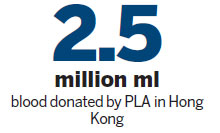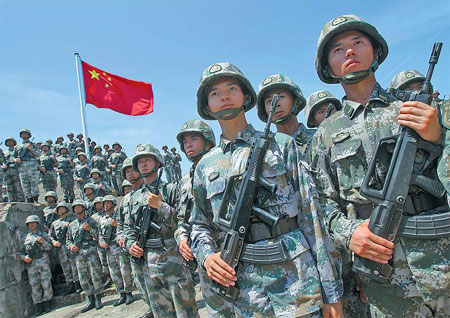PLA attracts interest of HK citizens
Updated: 2012-06-29 08:06
By Zhao Shengnan in Hong Kong (China Daily)
|
||||||||

|
Soldiers of the People's Liberation Army pose for photographs at the Stanley barracks in Hong Kong earlier this month. Edmond Tang / China Daily |

Shortly after being stationed in Hong Kong, Brigadier Zhang Jie said he was asked by a city official why were his soldiers "so invisible".
The People's Liberation Army troops had been at the garrison for a month, following the return of Hong Kong to China on July 1, 1997, and many residents expected them to have a high-profile presence.
"I told the official that the reason we were invisible was because we only leave the base when necessary, to not disturb residents," Zhang said ahead of the 15th anniversary of the handover.
This is a policy that stayed unchanged for 15 years.
The garrison, which has roughly 8,000 troops spread over battalions of infantry, engineers, airborne staff and navy personnel, is housed in several bases across the special administrative region.
Due to some differences between the mainland and Hong Kong, which the United Kingdom controlled for more than a century, and the "one country, two systems" policy, PLA troops stationed adhere to stricter rules than those in other parts of China.
"We have to be committed to strict discipline to gain the trust of Hong Kong citizens," said Zhang, who heads the garrison's infantry division.
Liang Yuejia, deputy director of the garrison's political department, explained that there was a lot of suspicion among residents at first that soldiers would get involved in local affairs, such as reacting to street protests.
"But we didn't. Unless the protesters illegally entered our barracks or threatened our lives, we did not resort to contacting the police," he said, adding that they respected such activities according to local regulations.
Even when anti-communist literature was thrown over the walls or staff received harassing calls from political groups, officials said they did not react.
That policy of noninterference has over the years helped the garrison gain a good image among residents.
A poll of 1,006 people by the University of Hong Kong last year found that only about 2 percent of those polled had a negative opinion about the garrison.
"Developing a good relationship with citizens has been the key," said Lieutenant General Zhang Shibo, commander of the garrison. "I think that mission has been accomplished."
Major Wu Qiong, a battalion commander with the garrison's communication station, added: "Before 2000, Hong Kong citizens usually kept their distance. But after years of interaction, many now often say hello. I guess that's because they are aware of our decent style of working and strict discipline."
Increasing openness
Compared with the "invisibility" of the early years, the garrison has greatly increased its openness to the outside world in recent years.
Besides regular training and exercises for army personnel, officials have also been promoting links between Hong Kong and the mainland through various activities, said Lieutenant General Zhang Shibo.
The troops have actively participated in public activities, such as planting more than 50,000 trees, donating 2.5 million milliliters of blood and helping more than 2,600 elderly people and children in care homes.
The garrison has also opened its barracks 23 times to visitors, receiving around 469,000 local people, and held summer camps for children.
The last open day, on May 1, attracted 37,000 visitors, far more than the 28,000 expected and extra free admission tickets had to be distributed. Some people waited in line overnight to get a ticket.
During the open days, guests can view the military facilities and watch soldiers perform combat skills and motorcycling stunts, including drills by the first female special forces of the PLA army.
"One of the reasons why we are gaining increasing recognition in Hong Kong is that the openness of the barracks provides local people with an opportunity to know more about us, as well as a platform for us to serve them," said Lieutenant General Wang Zengbo, political commissar of the garrison.
The activities organized by the garrison also present the PLA, the Communist Party of China and the mainland to Hong Kong residents in a proper way, Wang said. "Their national identity and patriotism have greatly increased," he said.
The garrison has organized seven military summer camps for around 1,200 local teenagers, six exchange activities with 1,600 students from 12 local universities and a military camp for college students. The troops also visited the University of Hong Kong for the first time in 2011 and talked with students.
A total of 215 teenagers participated in the military summer camp in 2011, and the number is expected to reach 260 this year.
"Despite the increase, every school can only send one student, while dozens of others actually want to come, so we'll continue enlarging the camp's scale in future," said Wang.
Tung Chee-hwa, former chief executive of Hong Kong, said the camps influence many families and hundreds of people even though there are only about 200 participants every year, and they also would influence the participants' whole life even they only last for 15 days.
In 2010, Hong Kong saw an upsurge of young people wanting to enlist in the military. Most of the 4,000 local young people who signed up for enlisting participated in the garrison's exchange activities and military camps.
The summaries written by military camp participants revealed that the 15-day interaction with the garrison provided them with a chance to learn more about the troops, socialism, the Communist Party of China, as well as the strength of the PLA and China, Wang said.
Boosting defenses
With the garrison enjoying a good image in Hong Kong, Zhang Shibo said the focus has shifted from public relations to bolstering military defense.
The mission of the garrison is mainly to exercise China's sovereignty over Hong Kong, safeguard social stability and provide disaster relief and defense campaigns. However, military training is also a priority.
"Since 2007, we have invested millions to upgrade our army's equipment, navy and air force," said the garrison's commander.
Based on Hong Kong's strategic features, the PLA garrison added a special forces unit, an armored battalion and a chemical defense battalion. It has also been equipped with reconnaissance planes, armed helicopters and air defense missiles.
Soldiers receive regular training. More than 20 drills were held in Hong Kong over the past 15 years.
"We aim to test our basic military strength, commanding and organizing capabilities through joint drills," Zhang Shibo said.
The infantry brigade, the garrison's pillar force, has ranked at the top for three years in the military competitions in the adjacent PLA Guangzhou Military Area Command, which has the administrative control of the garrison.
Speaking of the possible challenges the garrison faces, Brigadier Zhang Jie said the garrison "needs to be prepared to tackle possible regional conflicts at all times".
Yu Daimin in Hong Kong
contributed to this story.
zhaoshengnan@chinadaily.com.cn
(China Daily 06/29/2012 page3)

 Relief reaches isolated village
Relief reaches isolated village
 Rainfall poses new threats to quake-hit region
Rainfall poses new threats to quake-hit region
 Funerals begin for Boston bombing victims
Funerals begin for Boston bombing victims
 Quake takeaway from China's Air Force
Quake takeaway from China's Air Force
 Obama celebrates young inventors at science fair
Obama celebrates young inventors at science fair
 Earth Day marked around the world
Earth Day marked around the world
 Volunteer team helping students find sense of normalcy
Volunteer team helping students find sense of normalcy
 Ethnic groups quick to join rescue efforts
Ethnic groups quick to join rescue efforts
Most Viewed
Editor's Picks

|

|

|

|

|

|
Today's Top News
Health new priority for quake zone
Xi meets US top military officer
Japan's boats driven out of Diaoyu
China mulls online shopping legislation
Bird flu death toll rises to 22
Putin appoints new ambassador to China
Japanese ships blocked from Diaoyu Islands
Inspired by Guan, more Chinese pick up golf
US Weekly

|

|







